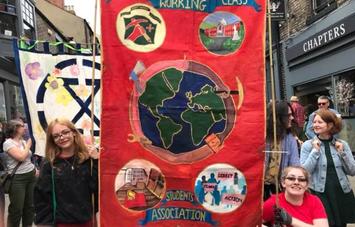
It’s thirty years this autumn since I began my undergraduate degree at Durham University in the North East of England. To tell you the truth I didn’t know much about the city before I applied there. My visit for the three required interviews was very enjoyable, and more positive than some of the less elite institutions I had applied to. I enjoyed looking about the Norman castle and cathedral set high on a hill surrounded by the moat-like River Wear. I should have guessed something was up however when the tutor in the sociology department asked me “What’s a good working-class boy like you want to come to a place like this?”. It was meant positively, and I took it in that way, but the penny really dropped when I arrived in the late September of 1990. I think about 60% of students then came from public schools (meaning they were privately educated), but in those first days and weeks of the autumn term it felt like 95% or more. Someone explained to me that Durham was where the public-school kids who couldn’t get into Oxbridge went. The result was often a toxic mixture of slumbering resentment among people who felt they had somehow missed out on their pre-ordained entitlement.
Class privilege was etched into the University, and the public-school kids took to it like ducks to water. Durham for them was simply an extension of the public-school system with colleges instead of houses, black tie formal dinners, and intense social networks built between their schools through sporting activities. The ‘Rahs’, the pejorative name for the worst-behaved of the tribe, walked around as if they owned the place. They had their own dress code, they sounded different, and they were often much taller than the students from ‘ordinary’ backgrounds or the local population of Durham City – in short they literally embodied class privilege.
This made Durham an excellent place to study sociology, especially class. It also makes clear how easily those with privilege deny their advantages. Students took offence in seminars where a tutor might gently try to lift the lid on the benefits some of my more upper-class peers might have enjoyed. I remember one woman took my tutor to task for even suggesting privilege by pointing out that her father had “Worked jolly hard to put her and her three siblings through public school at over £10,000 each per year”. I think I remarked that my dad had never earnt more than £10,000 a year in his entire working life, but the irony was lost on the rest of my class mates. The lid was firmly shut.
And there was a darker side to this experience of class. There was the working-class local kid who shared a bedroom in my student accommodation with a ‘Rah’. It was he rather than the ‘rah’ who left quietly after Christmas, never to return, so alienated was he by the whole experience. Or there was my teacher Ian, a local lad who had gained a first-class degree in sociology and an excellent PhD from Durham University but was laughed at as soon as he opened his mouth to give a large first-year lecture. His was a local North-East accent, something a largely public-school audience could only mock as it wasn’t the educated, received English that they and everyone who had ever taught them, or exercised authority over them, had shared.
Over the last three decades I’ve returned to Durham a number of times. I somehow assumed that things must have changed over the intervening years, but in the last couple of months Durham University has become the poster child for a form of toxic classism directed at working-class, often local students at the University. One of those students, Lauren White, eventually complied a report detailing instances from petty slights through to more serious incidents. As White noted of her treatment, “At first when they mocked and mimicked my accent, I sort of went along with it, even laughed, but then when I persistently became the butt of jokes about coalmining and started to get called feral because I was local it started to feel malicious.”
Read the rest of this piece at Working Class Studies.
Tim Strangleman, Professor of Sociology at the University of Kent, is a Contributor to Working Class Studies.
Photo: Members of the Durham University Working-Class Students Association marching in the city. Source: DurhanWCSA on Facebook.












